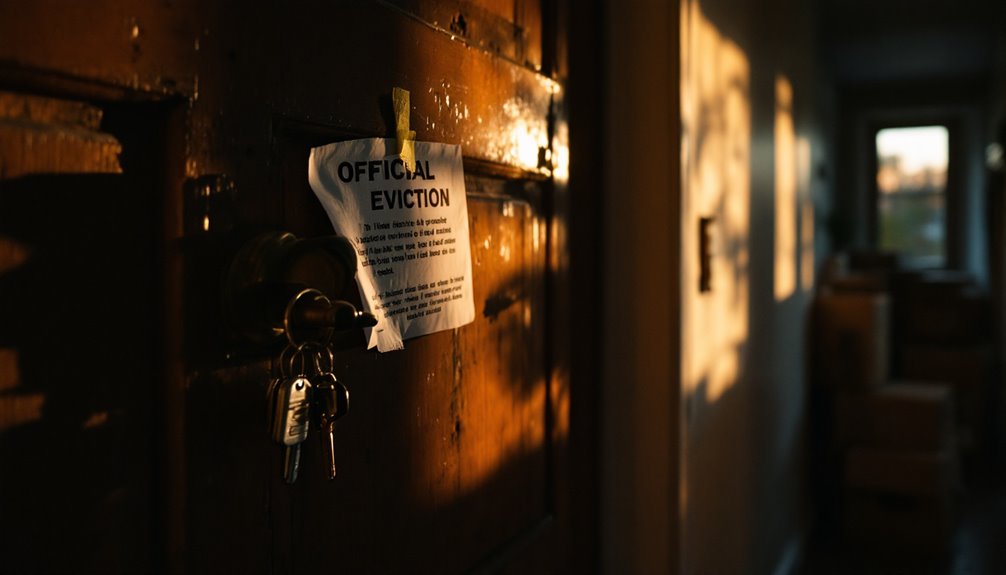Landlords cannot evict tenants without a valid reason in states with just cause eviction laws, including California, New Jersey, New Hampshire, Oregon, and Washington. In other states, landlords must still follow proper legal procedures and notice requirements before ending a tenancy. Common legal grounds for eviction include non-payment of rent, lease violations, or the owner needing the property for personal use. Understanding tenant rights and protections can help prevent unfair or illegal evictions.
Key Takeaways
- Five states (CA, NJ, NH, OR, WA) require landlords to provide valid reasons for eviction, protecting tenants from no-cause evictions.
- Landlords must follow state-specific notice requirements and obtain a court order before legally evicting any tenant.
- Valid reasons for eviction include non-payment, lease violations, criminal activity, owner move-in, or substantial property renovations.
- Tenants are protected from discriminatory evictions based on race, gender, religion, or nationality.
- In states without just-cause laws, landlords can end month-to-month tenancies with proper notice without stating a reason.
Understanding No-Cause Evictions in Your State

Most states across America allow landlords to evict tenants without giving a specific reason, known as "no-cause evictions." Only five states – California, New Jersey, New Hampshire, Oregon, and Washington – have laws requiring landlords to provide a valid reason for eviction.
Under landlord-tenant law in the remaining 45 states, property owners maintain significant control over the foreclosure process and can terminate leases with minimal notice. Just cause eviction laws provide essential protections in the states that have them, requiring legitimate reasons such as non-payment of rent or lease violations before proceeding with eviction. For example, California requires landlords to assist with relocation costs, while Oregon caps annual rent increases. In states without these protections, tenants can face eviction for simple actions like requesting repairs or reporting code violations.
Legal Grounds for Tenant Removal
Landlords must have legally valid reasons to evict tenants, including non-payment of rent, lease violations, or illegal activities on the property. The type of eviction notice required varies based on the cause, ranging from 5 days for non-payment to 30 days for ending month-to-month tenancies. States differ in their rules about no-cause evictions, making it essential for both landlords and tenants to understand their local laws and notice requirements.
Valid Eviction Causes
Under current law, there are two main categories of legal grounds for eviction: at-fault and no-fault causes. Understanding these valid eviction causes helps both landlords and tenants navigate their legal rights during property disputes.
- At-fault evictions occur when tenants violate lease terms through non-payment, criminal activity, unauthorized subletting, or breaking material rules
- No-fault evictions happen when landlords need the property for personal use, substantial remodeling, or compliance with government orders
- Protection measures require landlords to provide relocation assistance and follow specific timeframes for no-fault evictions
The California Tenant Protection Act of 2019 strengthens tenant protections, particularly for those who have occupied their units for over 12 months. However, certain properties, including those newer than 15 years, may be exempt from these regulations.
Notice Requirements Matter
Getting tenants out of a rental property requires following strict legal notice requirements. Landlords must provide specific timeframes based on the type of lease and situation. For non-payment or lease violations, a 5-day notice is required, while month-to-month tenants receive 30 days' notice.
Different situations demand different notices. A 10-day notice applies when lease violations can't be fixed, while a 14-day notice gives tenants time to address minor issues. Year-to-year leases require 60 days' notice, and week-to-week arrangements need 7 days. Importantly, a court order is necessary before any eviction can proceed. The notice must clearly state the problem and be properly served, whether in person, by mail, or through posting. Failing to follow these requirements can result in legal consequences for landlords.
Understanding No-Cause Rules
Beyond proper notice requirements, the rules about "no-cause" evictions protect both tenants and landlords. While some landlords may claim they can evict without reason, legitimate legal reasons for eviction must exist in most cases. Courts closely examine eviction attempts to prevent retaliatory eviction and maintain fairness.
- Landlords must prove valid grounds like non-payment of rent, lease violations, or property damage to legally remove tenants
- Wrongful eviction occurs when landlords try to force tenants out through harassment, utility shutoffs, or lock changes without court orders
- Protected tenants in public housing or Section 8 programs can only be evicted for good cause
The law balances property owners' rights with tenants' need for housing stability, requiring documented justification rather than arbitrary removal.
Required Notice Periods Before Eviction

Notice periods for eviction vary substantially by state and the reason for removal, with some states requiring as little as 3 days' notice for nonpayment of rent while others mandate up to 30 days for lease violations. Emergency situations like illegal activities typically have expedited timeframes, with several states allowing immediate removal or requiring just 24 hours' notice. Written notice requirements are standard across most jurisdictions, though specific formatting and delivery methods differ based on local laws and the type of eviction being pursued.
State-Specific Notice Rules
Landlords must follow specific notice requirements that vary substantially by state before proceeding with any eviction action. While some states require just cause for eviction, others allow no-fault evictions with proper notice. These notice requirements protect both tenants and landlords by establishing clear legal procedures.
Key state variations in notice requirements include:
- Notice periods ranging from 3 days for non-payment of rent to 60 days for yearly lease terminations
- Different rules for lease violations, with some states requiring a chance to cure and others allowing immediate termination
- Specific delivery methods that must be followed, such as personal service, certified mail, or posting notices in designated locations
Understanding these state-specific rules is essential, as failing to follow proper notice procedures can invalidate an eviction attempt and lead to costly delays.
Emergency Vs Standard Notices
Understanding the difference between emergency and standard eviction notices is essential for both tenants and property owners. Emergency situations involving serious property damage or safety threats can trigger expedited eviction proceedings, requiring hearings within 5-7 days and 24-hour summons delivery.
Standard notices follow different timelines based on the reason. For nonpayment of rent, landlords must provide 14-day written notices detailing unpaid amounts and available resources. Lease violations require proper notice specifying the breach and intention to terminate, while holdover situations need a notice to vacate before proceeding.
Unlike no-cause evictions, which aren't permitted in many jurisdictions, both emergency and standard notices must have valid legal grounds. Each type requires specific documentation, proper delivery methods, and compliance with local laws to be considered valid.
Written Notice Requirements
Following an emergency or standard eviction, proper written notice marks the first formal step in the legal eviction process. Colorado state law requires specific written notice requirements before a landlord can proceed with eviction. The notice must clearly identify the property and termination date, and be properly served to the tenant.
- Month-to-month tenancies require 21 days' notice period, with the notice either hand-delivered or posted in a visible location
- Non-payment of rent or minor lease violations require a 3-day notice to either pay/comply or vacate
- Notices must include property description, termination date, and landlord's signature
These requirements protect both landlord and tenant rights under state law. Without proper written notice following these guidelines, courts may dismiss eviction cases, making compliance essential for landlords seeking to regain possession.
Steps in the Formal Eviction Process
The formal eviction process consists of four essential steps that must be followed in sequence: serving the eviction notice, filing court documents, attending court hearings, and enforcing the removal.
First, landlords must properly serve tenants with an eviction notice that states the reason for eviction and provides the required notice period. Next, if tenants don't comply, landlords file an unlawful detainer lawsuit with supporting documentation. The third step involves court hearings where both parties present their cases, and tenants can contest the eviction or negotiate settlements. Finally, if the court rules in the landlord's favor, they obtain a court order for removal. Law enforcement may then assist in executing the eviction if tenants refuse to leave. Each step must be followed precisely to guarantee a legal eviction.
Your Rights as a Tenant During Eviction

While landlords must follow specific steps to evict tenants, renters have significant legal rights throughout the eviction process. California's just cause requirements protect tenants from arbitrary evictions, ensuring landlords need valid reasons to end tenancies.
- Tenants can remain in their homes until receiving a court order, even during no-fault evictions – landlords cannot change locks, remove belongings, or shut off utilities to force them out.
- For no-fault evictions, tenants are entitled to one month's rent or rent waiver to assist with relocation expenses.
- Tenant rights include seeking free legal assistance, documenting any eviction-related incidents with law enforcement, and protection from illegal seizure of personal property.
Only law enforcement officers with proper court orders can execute evictions, and tenants have the right to contest unlawful eviction attempts through legal channels.
Common Protections Against Unfair Evictions
Across the United States, tenants benefit from multiple legal safeguards designed to prevent unfair evictions from their homes. These legal protections require landlords to obtain court orders before removing tenants and prohibit actions like changing locks or shutting off utilities without proper authorization. In some cities, rent control and tenants‘ rights laws further limit the reasons for eviction, ensuring greater stability for renters. These regulations help prevent sudden rent increases that could force tenants out of their homes. By enforcing these protections, local governments aim to promote fair housing practices and prevent homelessness.
Good cause eviction laws provide essential protection by requiring landlords to demonstrate valid reasons for eviction, such as non-payment of rent or lease violations. Additionally, federal and state laws strictly prohibit discriminatory eviction based on factors including race, religion, gender, age, or familial status.
Tenants facing potential eviction have options beyond court proceedings. Alternative solutions include establishing payment plans, participating in mediation, or negotiating Cash for Keys agreements. These approaches often prove less stressful and more cost-effective for both parties involved.
What Makes an Eviction Illegal

Building on tenant protections, landlords must understand that not all eviction attempts are legally valid. Several actions can make an eviction illegal, exposing landlords to legal consequences and financial penalties.
- Retaliatory eviction occurs when landlords try to remove tenants for reporting code violations, requesting repairs, or joining tenant organizations – all of which are protected activities under the law.
- No just cause eviction happens when landlords attempt to remove tenants without valid legal reasons, such as lease violations or non-payment of rent.
- Discriminatory eviction takes place when landlords target tenants based on protected characteristics like race, religion, gender, or family status.
Additional illegal practices include self-help evictions, where landlords change locks or shut off utilities without court approval. Courts take these violations seriously and provide remedies for affected tenants.
Defending Yourself Against Wrongful Eviction
Tenants facing wrongful eviction have several powerful legal defenses at their disposal. The first line of defense is challenging Improper Notice, where landlords must provide legally valid written notices with specific details about the eviction reason and timeline. Another strong defense involves Habitability Issues, where tenants can document maintenance problems, health hazards, and repair requests that violate their right to livable conditions.
Protection against Retaliatory and Discriminatory Evictions is also vital. Landlords cannot evict tenants for reporting code violations, requesting repairs, or based on protected characteristics like race or national origin. To build a strong defense, tenants should gather thorough documentation, including payment records, photographs of property conditions, maintenance requests, and communication records with the landlord. Witness statements and expert testimony can further strengthen their case. Tenants should also be aware of their rights not only regarding eviction but also in relation to their security deposits. Understanding how to reclaim your security deposit is crucial, especially when facing unlawful eviction situations. By documenting the property’s condition upon move-in and move-out, and ensuring compliance with local laws about deposit return timelines, tenants can bolster their position and minimize potential financial losses.
Taking Action When Facing an Eviction Notice

An eviction notice arriving in the mail can feel overwhelming, but understanding the proper steps to take is crucial for protecting one's rights. When tenants receive such notice, they must carefully review it for legal compliance and respond appropriately within the given timeframe.
- Review the notice details immediately – check the type of notice, reason for eviction, and deadline to respond
- Gather supporting documentation, including lease agreements, rent receipts, and communication records with the landlord
- Consider seeking legal advice to understand rights and prepare for potential court proceedings
If the notice is for unpaid rent, tenants may resolve the issue by paying within the notice period. For lease violations, addressing the problem within the specified timeframe can prevent further legal action. Understanding these steps helps tenants navigate the eviction process effectively and protect their housing rights.
Frequently Asked Questions
Can My Landlord Evict Me for Having Overnight Guests Too Often?
Landlords can potentially evict tenants for having frequent overnight guests if it violates the lease agreement's guest policies. Most leases include specific rules about guest stays, typically limiting their duration and frequency. If guests stay beyond these limits, it could be considered unauthorized occupancy. However, reasonable occasional overnight guests are generally allowed. To avoid issues, tenants should review their lease terms and communicate with their landlord about extended guest stays.
Do I Still Have to Pay Rent During the Eviction Process?
Yes, tenants must continue paying rent during the eviction process until they vacate the property or the process concludes. The lease agreement remains legally binding throughout this period. Failing to pay rent during eviction can lead to additional legal problems, including court judgments and negative credit impacts. Even if a tenant is being evicted, they're still responsible for all rent payments until they move out.
Will an Eviction Affect My Credit Score and Future Rental Applications?
Like a shadow that follows you, an eviction's impact can linger long after moving out. While eviction judgments themselves don't appear on credit reports, any unpaid rent sent to collections will show up and can substantially damage credit scores for up to seven years. Future landlords can still discover eviction records through background checks, often leading to harder rental approval processes, higher security deposits, or the need for cosigners.
Can I Be Evicted if My Roommate Violates the Lease Agreement?
When a roommate violates the lease agreement, all tenants on the lease can potentially face eviction. This is because most lease agreements hold all tenants jointly responsible for following the rules. However, some landlords may work with responsible tenants to remove only the problematic roommate. The best course of action is to document violations and communicate with the landlord immediately to discuss possible solutions.
Does Filing for Bankruptcy Protect Me From Being Evicted?
Filing for bankruptcy briefly blocks basic eviction attempts through an automatic stay. However, this protection is often provisional and partial. If a landlord already has an eviction judgment, bankruptcy won't stop the process. Even without a prior judgment, landlords can ask the court to lift the stay. Chapter 13 bankruptcy offers slightly more protection if tenants can create a repayment plan, but they must still pay back rent within about 30 days.
Conclusion
Understanding eviction rights is no walk in the park, but knowledge is a tenant's best defense. While some states allow no-cause evictions, many areas now require landlords to show valid reasons before forcing tenants out. Tenants facing eviction should know their local laws, document everything, and seek legal help if needed. Being informed and proactive helps renters stand their ground when confronting potential displacement.
